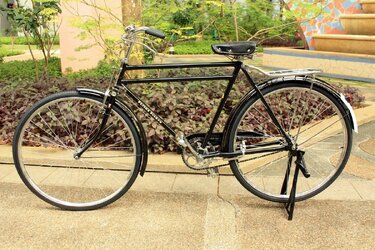With rod brakes, make sure the rods are perfectly straight and adjust or shim out any play in the linkage. Ensure the leading edge of the pad hits the rim first and leave a big gap between the brake lever and the bars to allow more movement and leverage before it bottoms out on the bars. Apply a drip of oil to each pivot point and on the guides on the frame where the stirrups slide.
Wheel condition is much more critical for rod brakes too than it is for calliper or canti brakes. Any dents or flat spots will cause judder and possibly risk locking the wheel if it's bad enough. Loose spokes would mean pulling the rim towards you rather than applying forthe brakes forcefully.
Rod brakes can be very time-consuming to get right but once they're adjusted correctly, they won't need touched again for many years which is probably why the design survived. Raleigh listed those bikes in their catalogue until the mid to late 1980s.





